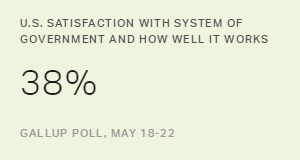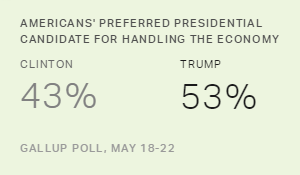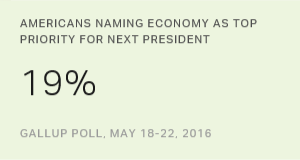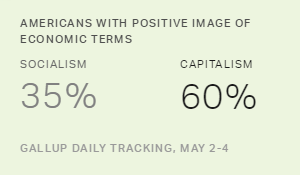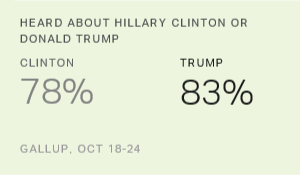Americans are significantly more satisfied with their opportunity to get ahead in this country than they are with the U.S. system of government and how well it works.
| Total satisfied | Total dissatisfied | ||||||||||||||||||||||||||||||||||||||||||||||||||||||||||||||||||||||||||||||||||||||||||||||||||
|---|---|---|---|---|---|---|---|---|---|---|---|---|---|---|---|---|---|---|---|---|---|---|---|---|---|---|---|---|---|---|---|---|---|---|---|---|---|---|---|---|---|---|---|---|---|---|---|---|---|---|---|---|---|---|---|---|---|---|---|---|---|---|---|---|---|---|---|---|---|---|---|---|---|---|---|---|---|---|---|---|---|---|---|---|---|---|---|---|---|---|---|---|---|---|---|---|---|---|---|
| % | % | ||||||||||||||||||||||||||||||||||||||||||||||||||||||||||||||||||||||||||||||||||||||||||||||||||
| Our system of government and how well it works | 38 | 61 | |||||||||||||||||||||||||||||||||||||||||||||||||||||||||||||||||||||||||||||||||||||||||||||||||
| The opportunity for a person in this nation to get ahead by working hard | 62 | 37 | |||||||||||||||||||||||||||||||||||||||||||||||||||||||||||||||||||||||||||||||||||||||||||||||||
| Gallup, May 18-22, 2016 | |||||||||||||||||||||||||||||||||||||||||||||||||||||||||||||||||||||||||||||||||||||||||||||||||||
I bring up these recent data because they underscore a much larger body of data pointing out just how negative Americans are when asked about their government and their elected representatives, and the way all of this operates.
is now at 18%. Just 8% of Americans have "a great deal" or "quite a lot" of in Congress, putting it at the bottom of a list of U.S. institutions tested. Further, 15% the job that Congress is doing as "excellent" or "good," a percentage that drops to 7% among those who are the most knowledgeable about Congress. Over half say that most members of Congress are , and the perceived are near the bottom of a list of all professions tested.
All of this shows up when we ask Americans about the facing the nation today. "Dissatisfaction with government" is near the top of the list, and was the single most commonly mentioned concern for all of 2015.
Yet, few Americans Congress or dysfunctional government when asked in an open-ended fashion to name the top issue on which they want the next president to focus. In other words, the major perceived problems with how the U.S. government functions clearly come to mind when Americans think about the top issues facing the country, but not when Americans think about the problems the next president should address.
The problems that Americans do want , however, in most instances will require congressional input. These include the economy, jobs, national defense, immigration, healthcare and education.
We can note that President Barack Obama continues to attempt to address some of these problems by issuing executive orders and sidestepping Congress. Obama has said: "America does not stand still, and neither will I. So wherever and whenever I can take steps without legislation to expand opportunity for more American families, that's what I'm going to do." This creates controversy, and using executive orders to get things done is certainly not a new issue in the history of the nation. But there is a lot that has to be done with legislation -- including, as a prominent example, Obama's signature healthcare bill that Congress passed in 2010.
There is also the matter of a poorly functioning government apparatus, exemplified in recent weeks by a news focus on an inefficient Transportation Security Administration screening system causing long security lines at airports. Yet the public at this point doesn't "the size and efficiency of the federal government" an extremely high priority rating as something they want the presidential candidates to be talking about.
Additionally, Americans didn't offer much support to several failed Republican candidates who attempted to address the size and efficiency of the government in their own way -- most likely because these candidates came at it with a meat cleaver, rather than with a more subtle appreciation of the fact that Americans recognize the government needs to be fixed rather than dismantled. Ted Cruz, representing an extreme position on this issue, vowed to shut down whole departments of the federal government and over 20 government agencies and to force three employees to leave government service before one new employee could be hired. The public flat out rejected this approach when tested directly (the 18% who agreed with shutting down government departments was the lowest for more than 75 proposals tested), and of course, Cruz himself was rejected in his efforts to procure his party's nomination.
So we have a situation in which the average American at this point isn't giving high priority to the idea of the next president focusing directly on the inefficiencies and dysfunctions of the government, or on problems with the way Congress operates -- all while the evidence shows that Americans have obvious and major underlying concerns about these problems more generally.
In business, this would present a unique opportunity. The mantra in marketing is to find a problem or unmet need and then set out to address it. There is a clear unmet need out there, as far as Americans are concerned, when it comes to the way their government operates. Even though Americans do not immediately consider this a presidential priority, there seems to be a real potential opportunity for presidential candidates to change this, to connect with the people on these issues, and to show how they (the candidates) could and should address them.
The late Stephen Covey, in his extraordinary The 7 Habits of Highly Effective People, talked about the great value in focusing on production capabilities rather than just production. Improving the process of production can pay off more in the long run than just demanding more production (e.g., trying to get more golden eggs in the short term by killing the golden goose has long-term, disastrous consequences). My reading of the public leads me to believe Americans would welcome a discussion among those wanting to be the next chief executive on how they are going to work on the production capability aspect of government before they jump headfirst into attempting to pass new laws or issue executive orders.
The president acts as CEO of the nation. Smart CEOs address how their company functions -- how it works and what its processes are.
Donald Trump has some about getting together with Democratic and Republican leaders in his first 100 days to figure out how to proceed, certainly a step in this direction. Hillary Clinton hasn't clearly addressed this issue, nor has Bernie Sanders. All candidates could benefit from making it more of a focus, and in so doing put themselves more directly in touch with the average American. Again, my reading of the public's opinion at this point suggests that a more direct focus on the government and how it operates -- production capability -- would be closely in tune with what Americans see as a primary and fundamental problem facing the nation today.
